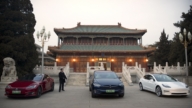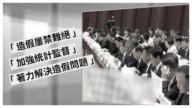【新唐人2014年04月24日訊】日前在北京舉辦的第四屆國際電影節上,美國著名導演奧利弗•斯通(Oliver Stone)到場參加,並直言批評中共當局對電影審查的制度,使他三度與大陸合作拍片的計劃無疾而終。他指出,如果想擁有真正好的電影和創新能力,中國必須對一些敏感題材解禁,面對歷史真相,對毛澤東進行批判。大導演斯通的 「大膽言論」引發了現場聽眾的強烈共鳴。
據大陸媒體報導,4月17號,第四屆北京國際電影節的「中外電影合作論壇」,在北京飯店舉行,多名中外導演和電影人、和媒體人齊聚一堂,其中包括兩位奧斯卡最佳導演獎得主奧利弗‧斯通與阿方索•卡隆。
素以「大膽直言」著稱的美國電影導演奧利弗•斯通,在論壇上被問及是否會到中國合作拍片時坦言,他20年來一直想在中國拍攝一部好電影,曾為尋求合作拍片三次到中國,但提出的三個合拍項目都不能實現,因為在中國拍片有太多的限制。
斯通不滿的表示:中國一方面請他來談合拍片,一方面又不願意正視中國的歷史,根本不願意去談論歷史,要談也是在規定的範圍之內。
北京藝術家、獨立製片人楊偉東:「從審查制度來講,據我所知,他們(中共當局)規定了很多條條框框,就是甚麼樣、甚麼樣的背景是不能涉及的。」
據美國《紐約時報》報導,斯通在北京電影節的論壇上詳細介紹了他合拍項目碰壁的緣由,一部是在1988年,他嘗試拍攝一段發生在「文化大革命」期間的愛情故事,遭到拒絕。被拒的理由是:中國絕不會拍攝一部涉及「文化大革命」題材的電影。
另一次是在2008年,斯通嘗試製作一部關於「中國面孔」的北京奧運會記錄片,並為此在北京街頭蒐集了上百幅照片。但是中共當局不斷有官員介入,審查這些在照片裡出現的面孔。最終,當局以「我們不想向世界展示這張面孔」、「這看起來不像是會讓我們感到驕傲的面孔」等理由,將記錄片查禁。
此外,斯通還透露,他曾在90年代初,嘗試拍攝一部關於毛澤東的電影,同樣被拒絕。
楊偉東:「因為毛澤東他自己本身就編織了很多謊言,文革死了多少人?文革是在甚麼歷史背景下產生的、出現的?有很多年輕人都是不知道的, 所以中國近代史有很多需要人們去發現、去挖掘、去揭露的這種真相。如果要把毛澤東徹底的給一分為二的剖析到以後,那等於共產黨(所謂)『合法的』這種『代表人民』的這個東西不就沒了嗎?」
斯通表示,「在美國,我們誠實的面對自己的過去,展示了自己的缺陷。」但中國卻不願正視錯誤。
楊偉東:「因為我採訪過很多太子黨,就是所謂的紅二代。就有一個人說,他說我們不可能去把我們父輩做的事情一概否定,否定了以後,那我們是誰?我們在幹甚麼呢?我們不可能去否定我們的父輩,就是明明知道這是錯的,但是大家都不願意站出來說這是錯的。」
斯通指出,如果想擁有真正好的電影,中國就必須對一些敏感題材解禁,面對歷史真相,對毛澤東進行批判。他說,「曾有無數中國電影對毛澤東進行吹捧,但卻從來沒有一部電影批評他,現在是時候了。只有這樣做,才能開放,才能攪活死水,讓這個國家出現真正的創造力。」
會上,斯通近乎「大膽」的言論,引起論壇現場眾多媒體人和電影人的強烈共鳴和歡呼喝采。而他因不滿論壇主持人對中外合拍「報喜不報憂」的官腔做派,幾次打斷主持人發言,主持人對此尷尬的以官腔回應說:「每一個不同的國家有它自己不同的要求,有它自己不同的特色。」
但斯通毫不客氣的回應說:看在上帝份上,你不能不面對你的真實歷史。
採訪編輯/張天宇 後製/李勇
Film Director’s Criticism of Censorship Wins Resonance
At a panel held in the 4th Beijing International Film Festival,
film director Oliver Stone bluntly criticized the censorship of
Beijing.
He said, “Three times I’ve made efforts to co-produce in this
country and I’ve come up short.”
He indicated to make good films of true creativity, China needs
to open up and face the history of the country and Mao Zedong.
Stone’s bold remarks earned applause from the audience of
movie business professionals.
Participating in the Fourth Beijing International Film Festival
discussion panel held in Beijing Hotel on April 17 were several
directors and filmmakers both Chinese and foreign, including
Oscar-winning filmmakers, Oliver Stone and Alfonso Cuarón.
Known for being outspoken, American film director Oliver Stone
spoke of co-production with China, but three times he came
up short because of too many restrictions.
Stone expressed his dissatisfaction: “You talk about
co-production but you don’t want to face the history of China.
You don’t want to talk about it.”
Yang Weidong, Beijing artist and independent filmmaker:
“As far as I know, about the censoring, the authorities set up
many rules and restricted topics.”
Stone spoke of his first intent to co-produce a film in China in
1988. He proposed a script about a love story during the
Cultural Revolution, but ran into a wall: China will not allow
any film about the Cultural Revolution.
The second time was in 2000, when he suggested a
documentary about the preparations for the 2008 Beijing
Olympics.
He had prepared hundreds of photos which were constantly
subject to official examination. Finally, this film was
nixed with the officials’ remarks such as “That doesn’t look
like a face we can be proud of. We don’t want to show that
face to the world,” reported NY Times.
Stone also revealed that he had attempted a film about
Mao Zedong in the early 1990s, but was also rejected.
Yang Weidong: “Mao Zedong made up many lies himself.
The younger generations don’t even know how many people
died because of the Cultural Revolution and the historical
background of the Cultural Revolution.
The truth of contemporary Chinese history is yet to be revealed.
If Mao Zedong is to be judged, in the end of the analysis,
the Chinese Communist Party will only lose its claim to
so-called ‘legality’ and ‘representing the people’.”
Mr. Stone said that the United States had examined its own
mistakes. “We’ve been honest about our own past in America,
we’ve shown the flaws,” but,
“you don’t want to face the history of China.”
Yang Weidong: “I interviewed many princelings, the so-called
second red generations.
One of them said, that there is no way to negate all what our
parents have done. If so, then who are we? What are we doing?
We can’t negate our parents.
That means even knowing it’s false, no one will stand out
and speak up.”
Stone indicated to make good films, China must lift the ban
on sensitive topics, face the history and be critical.
He said, “Mao Zedong has been lionized in dozens and dozens
of Chinese films, but never criticized. It’s about time.
You got to make a movie about Mao, about the Cultural
Revolution. You do that, you open up, you stir the waters and
you allow true creativity to emerge in this country.”
Stone’s remarks won applause from the audience of film
professionals both Chinese and foreign.
The panel moderator appeared to scramble to contain them,
couching much of her response in the language of officialdom.
She said, “Every country has different needs, has its own
characteristics,” reported the NY Times.
But Stone responded bluntly, to protect the country against
many, “but not your history, for Christ’s sake.”
Interview & Edit/Zhang Tianyu Post-Production/Li Yong



























